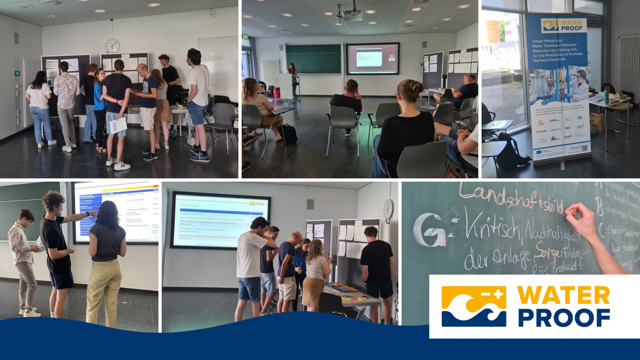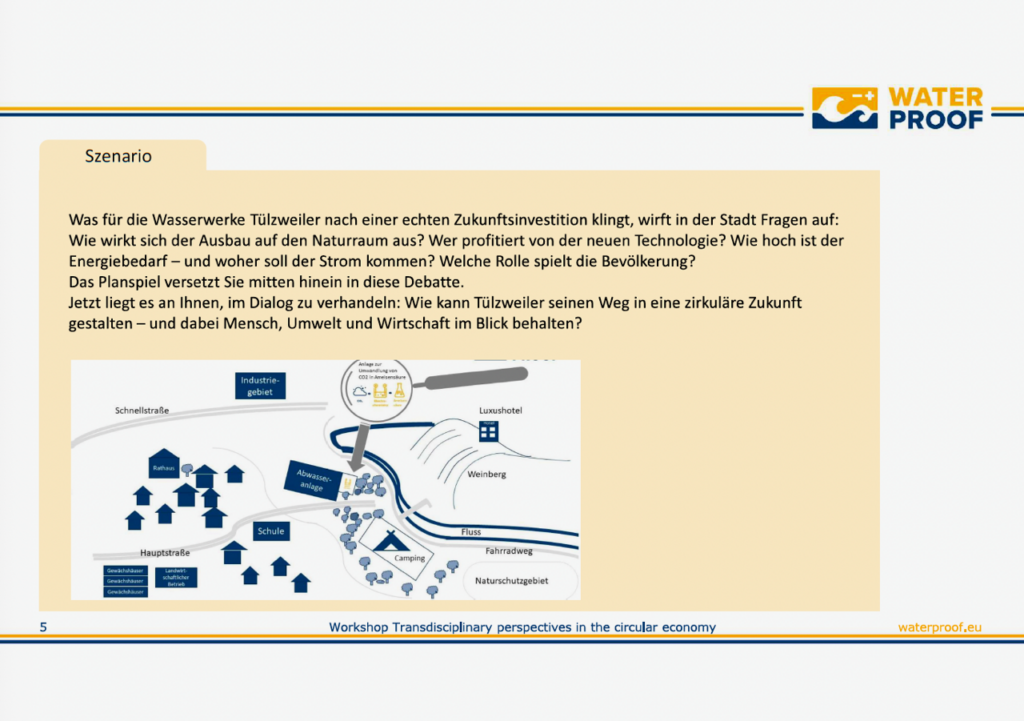Transdisciplinary perspectives in the circular economy – WaterProof training workshop for students and early-stage researchers
How can industry professionals, researchers and local communities work together to successfully close the carbon loop?

On 17 June 2025, experts, students and future professionals from disciplines such as engineering, climate science and social research came together at the Saarland University to answer this question in an interdisciplinary workshop organized by the EU-funded WaterProof project. The event titled “Transdisciplinary Perspectives in the Circular Economy” aimed to bridge the gap between technological innovation, social acceptance and practical application. All of which are key factors for a successful implementation of Carbon Capture and Utilisation (CCU) technologies in local communities and the establishment of a truly sustainable, circular economy. The event even took participants to the fictitious village of “Tülzweiler”, where in a simulation game they had to deliberate a proposed CCU plant extension from a multistakeholder perspective.
Collaborative approach for successful sustainable transition
The WaterProof project aims at developing an electrochemical process that converts CO₂ emission captured from consumer waste incineration and wastewater treatment facilities into formic acid. This formic acid can then be used in the creation of green consumer products, such as cleaning detergents, the tanning of fish leather, and special solvents (ADES) used in the recovery of precious metals from industrial waste incineration ash. In addition to the technological dimension, WaterProof follows a transdisciplinary approach, emphasizing dialogue among scientists, industry professionals, and community stakeholders to ensure that technological advancements align with societal needs, the specific needs of local communities and environmental objectives.
This training workshop exemplified the project’s commitment to knowledge transfer and collaborative problem-solving. Bringing together 12 participants from diverse fields, the workshop fostered lively discussion on the challenges and opportunities in closing carbon cycles while addressing the priorities of different stakeholder perspectives. Participants quickly recognised that integrating expertise from multiple disciplines is essential to develop robust and widely accepted solutions and public acceptance for CCU technologies and CO2-derived products.

Key assessment methods and simulation game
The workshop opened with an inspiring presentation by Lucas Albers from the nova-institute, who introduced the group to the method of Life Cycle Assessment (LCA) as well as Social-LCA, showcasing the importance of social risk management and the challenges of gethering data on qualitative variables, stakeholder perspectives but also global supply chains. This session emphasized the necessity of expanding the use of LCA-methodology to S-LCA, as well as the implementation of academic exercises into practical applications of technology development and product acceptance.
A highlight was a simulation game set in the fictitious village of “Tülzweiler”. Here, participants assumed the roles of local stakeholders deliberating a proposed CCU plant extension. Immersed in their adopted identities ranging from residents and business owners to environmental advocates and technology providers, the participants navigated and discussed concerns such as extensive land use, social and environmental fairness, stakeholder benefits, and environmental impact. This exercise displayed the intricate web of considerations that shape the acceptance and success of circular technologies in local communities.
Workshop outcomes and impact
The workshop delivered several positive outcomes:
- Enhanced understanding: Participants gained hands-on insight into the complexity of implementing CCU technologies, benefiting from both technical discussions and role-play-based learning. All attendees left with raised awareness for transdisciplinary perspectives.
- Strengthened soft skills: The training fostered key competencies including communication, perspective-taking, conflict resolution and teamwork. All these skills vital for industry professionals and researchers driving technological change.
- Fostering new approaches: The simulation game provided an innovative educational model, equipping future professionals with the mindset to assess sustainability challenges from multiple vantage points in a playful and innovative way.
The participant feedback was overwhelmingly positive, with many expressing a desire for more time to delve deeper into such comprehensive solutions, a clear indication of the engagement and value the workshop offered.
Advancing circular solutions
By equipping the next generation of researchers and industry-professionals with both knowledge and social competencies, WaterProof is helping to pave the way for a truly circular, renewable carbon future, where technological innovation is based on inclusive dialogue among all stakeholders.
This workshop was organised as part of an interdisciplinary lecture series at Saarland University, in cooperation with IZES gGmbH.
To stay informed about future actions and learn more about the project, visit the WaterProof website and sign up for the project-newsletter: https://waterproof-project.eu

Funded by the European Union. Views and opinions expressed are however those of the author(s) only and do not necessarily reflect those of the European Union or European Health and Digital Executive Agency. Neither the European Union nor the granting authority can be held responsible for them.
Source: Waterproof Project, press release, 2025-08-21.
